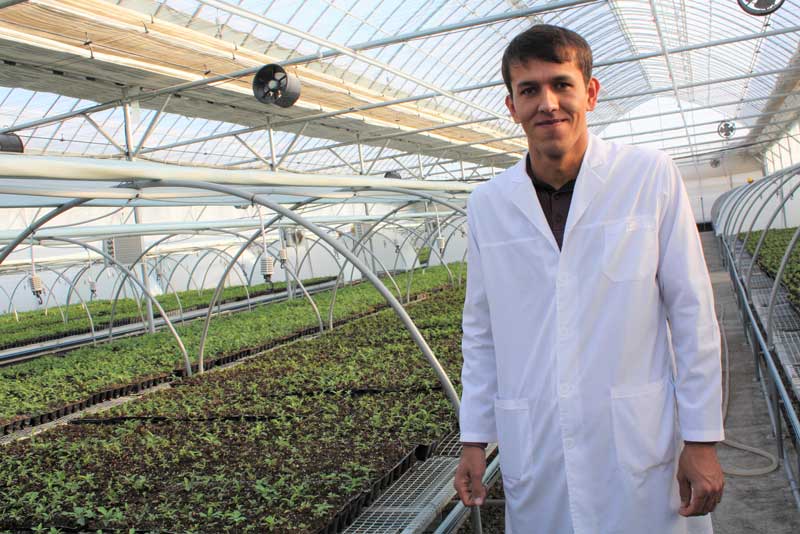As researcher Azim Marufov points out fruit tree seedlings growing in a sprawling greenhouse in Samarkand, Uzbekistan, he speaks of them with almost paternal concern. "They are like my babies," says the 26-year-old scientist.
Marufov works for Gala Osiyo Non, an agricultural company based in this ancient trading city on the former Silk Road. But though so much in Samarkand carries echoes of the past, the research Marufov conducts at the large complex is aggressively forward-looking. The company’s state-of-the-art laboratory and greenhouse grow and sell apple, cherry, pear, and other fruit tree seedlings for export to neighboring Russia, Kazakhstan, and other countries. The large-scale effort is the first of its kind for Central Asia’s agriculture sector.
Gala Osiyo Non was able to build the factory because of a $3.5 million loan from Ipak Yuli Bank, an IFC client. The company is planning to expand its operations and more than double its current number of employees to about 200 people.
These were exactly the kind of results-bearing investments IFC envisioned when it provided a local currency loan of up to $15 million to Ipak Yuli Bank in November 2018. The investment is part of larger IFC efforts to create jobs and fight poverty in Uzbekistan—a country that until just a few years ago was largely isolated from the outside world.

Opening Up to Investment
As a part of the efforts to help small businesses in Uzbekistan access crucial loans, IFC has been working with several of the country’s private banks to expand local currency lending to small businesses. To do this, IFC successfully sourced the Uzbek soum from international investors through issuance of the first Uzbek soum-denominated Samarkand bonds. IFC has raised 476 billion Uzbek soum to date (about $58 million) to enable Ipak Yuli Bank and long-term client Hamkorbank to boost their local currency lending to smaller businesses.
Such efforts are critical to Uzbekistan’s national growth. Micro, small, and medium enterprises employ about 80 percent of workers and are responsible for 60 percent of the gross domestic product. But they often struggle to access finance.
As a part of increasing access to finance for farmers, IFC is working with local financial institutions to help them understand the risks and develop lending tools unique to the agricultural sector. With support from IFC, for example, Hamkorbank has grown its agri-loan portfolio to about $137.2 million from just $400,000 in four years. To date, the bank has provided financing to more than 20,500 farmers. That's key in Uzbekistan, where almost half of the population lives in rural areas and farming comprises about 15 percent of GDP.
Reforms with Results
IFC and the World Bank are supporting Uzbekistan’s financial market infrastructure by helping revamp the country’s credit reporting system and reform its secured transaction system. With IFC’s support, Uzbekistan adopted a groundbreaking law that institutes greater requirements for credit bureaus to better serve financial markets. A new collateral registry law developed with IFC support has made it much easier for farmers and entrepreneurs who do not own buildings or land to secure much-needed loans.
IFC is also helping some state-owned banks become sustainable commercial financial institutions. This supports a government program that aims to increase the competitiveness of Uzbekistan’s economy by introducing new technologies and corporate governance best practices.
Join the conversation: #IFCimpact
Published in January 2019

